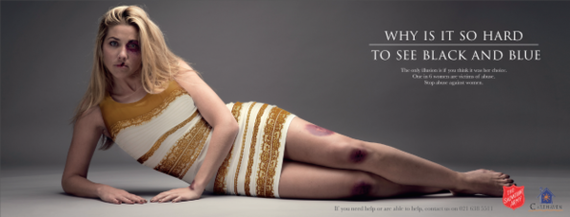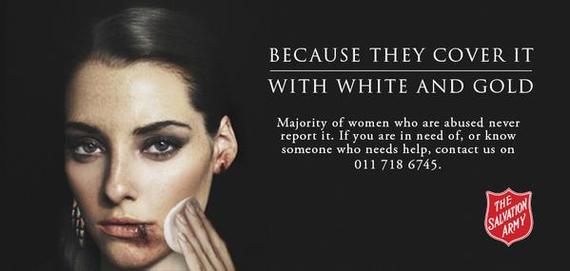"The only illusion is if you think it was her choice."
#Thedress, the meme, and social media came together in a big way last week. It started as silliness, the buzz broke the Internet and, incredibly, it resulted in a brilliant Public Service Announcement (PSA) -- a powerful meme designed to raise awareness about domestic abuse.
The Story
It all began innocently enough in Scotland when a mom sent her daughter, via Tumbler, a picture of a dress she might wear to the daughter's wedding. The bride-to-be shows it to her fiancé and they can't agree on the color of the dress. Wanting another opinion, the bride sends the photo to her talent agent who posts it online with the question: "guys please help me -- is this dress white and gold, or blue and black? Me and my friends can't agree and we are freaking the f**k out."
The post goes viral and people world-wide, famous and not so famous, "help" by voting on the color. Overshadowing major news stories, the dress debate gets dubbed "dressgate" and scientists weigh in on the optical illusion.
Enter the creative agency, Ireland/Davenport in South Africa. In less than 24 hours, it pulls together the brilliant PSA meme pictured above, to raise awareness about abuse against women. It uses a version of #thedress on a beautiful model -- who, if you look carefully, has a bruised eye, thigh, knees, and toes. And, in the upper right-hand side of the picture, it asks: Why is it so hard to see black and blue?
The agency offers it, pro bono, to the Salvation Army in South Africa, which gladly produces it. The PSA goes out in a tweet with the hashtags #StopAbuseAgainstWomen, #blackandblue, and #whiteandgold. And it, too, quickly goes viral, big time.
The Message
What makes the PSA photo so powerful is that at first glance you focus on the dress and beautiful model, almost missing the battering. The bruises are shocking as they shatter our original perception of an attractive woman who seems to have it all together. Equally powerful is the text challenging victim-blaming: "The only illusion is if you think it was her choice. One in six women are victims of abuse. Stop abuse against women."
It's a picture worth a billion words because it gets across a message advocates against domestic violence have been trying to teach us for years: Abuse has no boundaries. Brilliantly, it forces us to make the shift and acknowledge the victim could be anyone. You. Your sister. Your neighbor. Your daughter on prom night.
It shatters the illusion we have that if things look good, they are good. Freud said illusions save us pain and allow us to enjoy pleasure instead. He said we can't complain when illusions collide "with a bit of reality against which they are dashed to pieces."
We also have a hard time accepting that someone, who by society's standards, appears successful or privileged is a victim of abuse. In her groundbreaking book, Not To People Like Us, author Susan Weitzman writes about this overlooked population, coining the term "upscale abuse."
Lately, as a result of the Ray Rice incident and other high-profile domestic abuse incidents, the public has seen reality shatter the illusion of previously untouchable athletes and the NFL scrambling to repair the damage. During the last Super Bowl the NFL aired this chilling PSA based on a woman's call to 911.
It, too, is a powerful PSA. You sense the woman's imminent danger, know her abuser is close by, and yet you see her calmly and cleverly outsmarting her abuser -- pretending to order pizza when in reality she's talking to 911. Rather than pity her, you can't help but admire her tenacity and root for her.
Not wanting to be seen as "a domestic violence victim," many abused women never make that first call to the police. It's too humiliating. The PSA subtly shows the opposite is true -- that it takes courage.
The good news is the recent focus on domestic violence may embolden victims to come forward to get the much needed help they deserve. However, as Rene Renick of the National Network to End Domestic Violence (NNEDV) points out, in an ABC7News/WJLA interview last week, while the conversation is good, it highlights only physical abuse, which is just the tip of the iceberg for survivors.
About abusers, Renick says,
For every bruise you see there's maybe 100 or more other ways that person is controlling or abusing. The bruises go away often in a few weeks, but it's those emotional scars that can last a lifetime.
And, there's the big question asked by many: Why doesn't she just leave?
Survivors know the answer. There's the shock. Hard as you try, you keep remembering the good qualities of the person you think you married (or are with romantically). The life you've built together: You're paralyzed with the trauma of finding out it's a lie, an illusion, and you wonder how you could have been so stupid.
Then there's the crazy-making. Just as you decide it's time to get out, you're once again thrown off guard because he starts treating you so nicely you think "happily-ever-after" is possible. Eventually, though, you face the dreadful reality that things aren't going to change, it's not normal to be walking on eggshells, and you are in danger.
It takes a lot of courage to face the story you never chose. Not everyone is able to close the book, leave it behind and venture into the unknown. Fortunately, though, many do.


